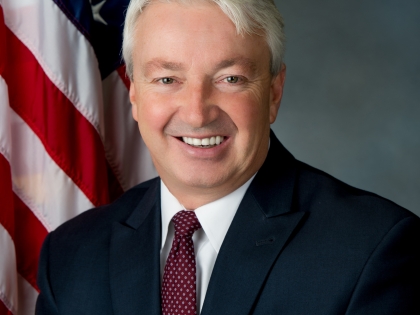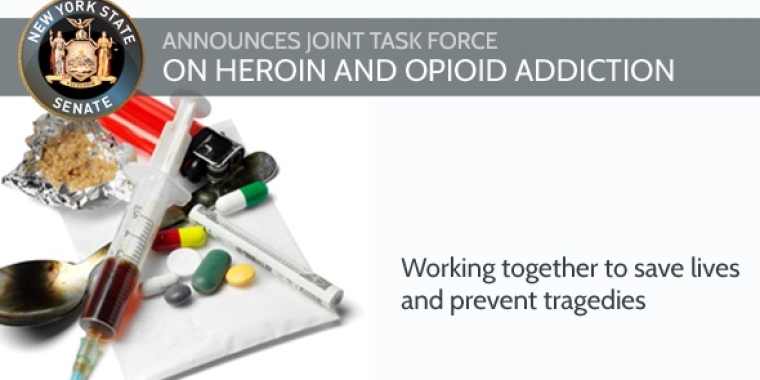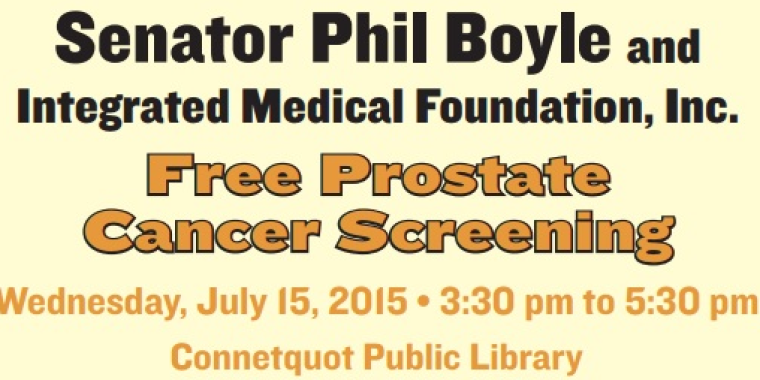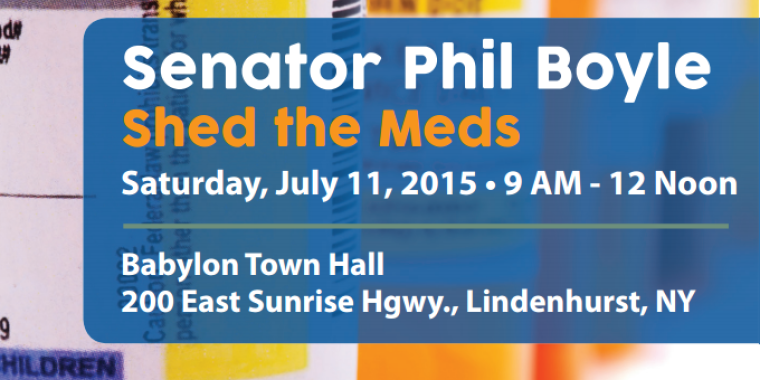
Senate Majority Coalition Announces Joint Task Force on Heroin and Opioid Addiction
Phil Boyle
March 17, 2014
-
ISSUE:
- Drugs

SENATE MAJORITY COALITION ANNOUNCES
JOINT TASK FORCE ON HEROIN AND OPIOID ADDICTION
Panel Will Develop Recommendations to Prevent and Treat Addiction
and Its Related Crimes
Senate Majority Coalition Co-Leaders Dean Skelos and Jeffrey Klein
today announced the creation of the Senate Task Force on Heroin and Opioid
Addiction to examine the rise in use of heroin and other opioids in New
York State and develop recommendations for treating and preventing
addiction.
The bipartisan task force will be chaired by Senator Phil Boyle
(R-C-I, Suffolk County), Chairman of the Senate Committee on Alcoholism and
Drug Abuse. He will be joined by task force Vice-Chair David Carlucci
(D-Rockland), Chairman of the Senate Committee on Mental Health and
Developmental Disabilities, and Vice-Chair Michael Nozzolio (R-C, Fayette),
Chairman of the Senate Codes Committee. Members will examine the issues
and solicit input from experts and other stakeholders about addiction
prevention and treatment options, the rise in heroin and opioid use, and
the potential for drug-related crimes and other negative community impacts.
The task force will then develop recommendations which will be used to
draft legislation to address the issues raised.
“I would like to thank Senators Skelos and Klein for creating this
important task force to combat this epidemic in our communities,” said
Senator Phil Boyle. “The heroin epidemic has wrought horrible tragedies
throughout our state and we need to act quickly and galvanize our efforts,
funding programs and devising legislation to end this scourge. The primary
mission of the Heroin and Opioid Task Force should be and will be to save
the lives of fellow New Yorkers.”
The task force will hold forums in communities across the state to
solicit input from stakeholders and experts and use the information
collected to develop recommendations for legislative action. The first
forum, held by task force Chairman Boyle, will take place on April 8, 2014,
from 10 a.m. to 2 p.m. in the Van Nostrand Theatre of Suffolk County
Community College’s Brentwood Campus, 1001 Crooked Hill Road, Brentwood.
Additional dates and locations for forums throughout the state will be
forthcoming.
In the Senate’s budget resolution passed last week, $5 million was
proposed for increased heroin prevention, treatment, and recovery support
services. The resolution also included a measure to increase the penalties
for drug dealers by making it a class B felony for anyone to possess 50 or
more individual packets of heroin and/or an amount of heroin with an
aggregate value of at least $300.
Senator David Carlucci said: “We can no longer ignore the fact that a
very real heroin epidemic is spreading throughout our state and putting our
children at risk. Instead of turning a blind eye, we need to be proactive,
and make sure our state is developing and implementing the best prevention
and treatment options available. This bipartisan task force will kick-start
that process so that we can reach more communities quickly and
effectively.”
Senator Mike Nozzolio said: “Combating the use of heroin and
opiate-based illegal drugs is critically important to protecting the safety
and well-being of all New Yorkers. The use of highly addictive opioid-based
narcotics has destroyed countless lives and families and is the fastest
growing drug problem in both our state and nation. As a member of this new
task force, I look forward to working with my colleagues to prevent drug
addiction, while strengthening criminal justice laws to keep drug dealers
off our streets and behind bars where they belong.”
The task force announced today will also examine the crimes that
accompany increases in illegal drug activity. In February, the New York
Times reported that the federal Drug Enforcement Administration’s (DEA)
heroin seizures in New York State increased 67 percent over the last four
years. The DEA’s New York office “seized 144 kilograms of heroin, nearly 20
percent of its seizures nationwide, valued at roughly $43 million.”
Heroin’s deadly affects are well established, and overdoses are on
the rise across the state. Data released by Newsday reported that heroin
“killed a record 121 people in Nassau and Suffolk in 2012 and at least 120
last year -- the two highest totals ever recorded.” The Buffalo News
reports that 29 people died of heroin overdoses in Erie County in 2013,
“almost a third more than the year before.” The Syracuse Post Standard
reported that heroin-related deaths “have climbed rapidly in Onondaga
County -- from two in 2010 to 24 in 2013.” In New York City, the Times
reported that “after several years of decline,” heroin-related overdose
deaths increased 84 percent from 2010 to 2012.
Some experts have pointed to the enactment of I-STOP, a state law to
curb the abuse of prescription opioids and other drugs, as one factor in
the dramatic increase in the number of heroin users across New York in
recent months. As prescription painkillers became more difficult to obtain
and more expensive when sold illegally, individuals turned towards heroin
because is it often cheaper and/or more easily obtained and provides a high
similar to prescription opioids.
A 2012 federal survey on drug use and health reported that the number
of people who said they used heroin in the past 12 months rose from 373,000
people in 2007 to 669,000 people in 2012. The agency also reported that the
number of people dependent on heroin rose, from 179,000 people in 2007 to
369,000 people in 2011.
According to the National Institutes of Health (NIH), in 2011, 4.2
million Americans aged 12 or older (or 1.6 percent) said they had used
heroin at least once in their lives. The NIH estimates that approximately
23 percent of individuals who use heroin become dependent on this highly
addictive drug.
Additional members of the joint task force include: Senator Greg Ball
(R-C-I, Patterson), Senator John Bonacic (R-C-I, Mount Hope), Senator Pat
Gallivan (R-C-I, Elma), Senator Martin J. Golden (R-C-I, Brooklyn), Senator
Joseph A. Griffo (R, Rome), Senator Kemp Hannon (R, Nassau), Senator
William Larkin (R-C, Cornwall), Senator Betty Little (R-C-I, Queensbury),
Senator Carl L. Marcellino (R, Syosset), Senator Kathleen A. Marchione
(R-C, Halfmoon), Senator Jack Martins (R-C-I, Mineola), Senator George
Maziarz (R-C, Newfane), Senator Patty Ritchie (R-C, Heuvelton), Senator
Joseph Robach (R-C-I, Rochester), Senator Diane Savino (D, Staten
Island/Brooklyn), Senator James L. Seward (R-I-C, Oneonta), and Senator
Cathy Young (R-I-C, Olean).
Senator Greg Ball said: “The epidemic of heroin addiction plaguing
our communities must be confronted head-on. It is sickening to read and
hear of the countless, needless deaths in our community. We must get to the
kids before it’s too late, talk is cheap, and what is needed is funding and
resources. As legislators, we must do everything in our power to protect
our children from drug addiction. The Task Force on Heroin and Opioid
Addiction will take input from constituents to find comprehensive solutions
and work towards reversing this deadly epidemic.”
Senator John Bonacic said: “The growing epidemic of heroin use
throughout New York State is alarming. It transcends regions, race, gender
and economic status. We must do everything in our power to help stop this
highly accessible and addictive drug from poisoning our communities.”
Senator Martin J. Golden said: “I look forward to working with my
colleagues to expand upon the I-STOP legislation to reduce drug addiction
and abuse. My district has been witness to the increase of heroin and
painkillers causing deaths in our youngsters and destroying families. We
must start to reverse these numbers and save lives here in New York.”
Senator Pat Gallivan said: “Heroin and opiate drug abuse is one of
the greatest public health challenges of our time; addiction and its
devastating consequences do not discriminate, affecting families from all
walks of life across New York State. As the former Sheriff of Erie County
and a New York State Trooper, I know firsthand the ramifications of
drug-related crimes. I look forward to working with the task force to
devise new and effective ways to prevent and treat addiction.”
Senator Joseph A. Griffo said: “Heroin is, sadly, a growing scourge
in the Mohawk Valley and North Country. We reduced the amount of
prescription drug abuse with the I-STOP law, but some of those addicts have
turned to opiates, which are plentiful and cheap on the streets. I look
forward to listening to our experts in crime prevention, as well as in
treatment of addiction, on new legislative strategies that will stem the
tide of illegal drugs permeating our streets and poisoning our residents.”
Senator Kemp Hannon said: “Drug addiction is a public health crisis.
New York State took a historic step in adopting I-STOP, a law that reduces
access to prescription opioids. One of the effects of the I-STOP
implementation has been the increase in heroin use. We must ensure addicts
can access treatment and that prevention measures are in place. I am
pleased to join the Senate’s Task Force on Heroin and Opioid Addiction and
look forward to continuing our work with experts and stakeholders to
address this crisis.”
Senator Bill Larkin said: “Heroin use has grown to epidemic
proportions throughout our society. I am pleased that this new, bipartisan
task force has been formed to tackle the tough issues facing our schools,
hospitals and communities. As heroin and opioid use grows at a greater
pace, we need a comprehensive approach to exploring the ways we can deal
more effectively with this menace and this task force is a step in the
right direction.”
Senator Elizabeth Little said: “Drug addiction is a form of
imprisonment that not only robs the user of a normal life but severely
impacts the lives of loved ones who often struggle in vain to help. Heroin
and opioid abuse is on the rise. It’s a serious problem in all areas of New
York State and, in order for a legislative response to be effective, we
need to hear from experts in all fields, including law enforcement and
health care. That dialogue will be very helpful.”
Senator Carl L. Marcellino said: “The surge of heroin use is creating
a statewide epidemic. It is an extremely powerful and addictive drug that
doesn’t discriminate when it comes to enslaving people to addiction. We
need to aggressively fight back to curb this widespread deadly problem.”
Senator Kathleen A. Marchione said: “Heroin abuse is a public health
epidemic. A heroin-related overdose recently claimed the life of Philip
Seymour Hoffman, the father of three young children and one of the most
gifted actors of his generation. This high-profile tragedy didn’t happen in
a vacuum. Behind every one of the rising heroin statistics is a person, a
family, a soul, and they need our help. Vermont Governor Shumlin devoted
his 2014 State of the State Address to having an honest conversation about
his state’s growing heroin and opiate crisis. We need that same
conversation here in New York because it’s not just a Vermont problem.
Heroin abuse, and deaths, are up across the Northeast, here in New York, as
well as Pennsylvania, Rhode Island, Massachusetts, Connecticut and Maine.
It isn’t enough to just say no – we need more information and answers, we
need to hear from affected families and communities. We also must match
effective treatment programs – and their funding – with strong law
enforcement. It is my hope that our new Task Force, under Senator Boyle’s
strong leadership as Chair, will take this type of holistic approach to
addressing the heroin public health crisis.”
Senator Jack Martins said: “Children are the number one target of the
exploding heroin epidemic. Far too many young lives have been destroyed by
this dangerous and deadly drug. We need to do more to stop heroin and
opioids from poisoning our children. As a member of this task force, I
look forward to developing new ways to protect our communities and stop
this growing epidemic.”
Senator George Maziarz said: “Heroin remains one of the most
dangerous and addictive drugs on the streets today. It ruins lives,
destroys families, and impacts our society in countless ways. I am happy
to be part of this collaborative new effort to reduce heroin use.”
Senator Patty Ritchie said: “Heroin is an extremely addictive drug
that has the power to ruin lives and destroy families. In Central and
Northern New York, we’ve seen an alarming increase in its usage and
according to officials, in some areas, the price of the drug has been cut
in half.”
Senator Joe Robach said: “It’s very concerning to me, not only as a
State Senator but as a father of three, to see the recent increase in
heroin usage and addiction in our state. We need to do a better job of
educating the public, particularly our youth, about the dangers of heroin
and all other dangerous recreational opioids. It’s my hope that this task
force will help us create measures to prevent future drug addiction.”
Senator Diane Savino said: “The growth of our state’s heroin epidemic
is alarming and requires immediate action. From Staten Island to Suffolk,
communities all across our state are experiencing firsthand the destruction
that this drug causes. This bipartisan Heroin Task Force is the right
prescription for action and will help us save lives.”
Senator James L. Seward said: “Heroin use has reached epidemic
proportions. Law enforcement resources are being stretched thin, public
health costs are skyrocketing, and lives are being lost. Heroin is
infiltrating all social, economic, and geographic sectors of our state and
we need to take definitive action to halt this ugly trend. I look forward
to working with Senator Boyle to advance a multi-prong strategy that will
help break the stranglehold this drug has on addicts and punishes those who
trade in this poison.”
Senator Cathy Young said: “The scourge of heroin abuse in our
communities is a growing epidemic that is destroying families and ruining
young lives at an increasingly frequent and alarming rate. My Senate
Republican colleagues and I recognize the seriousness of this epidemic and
the need for a more proactive approach to tackling heroin trafficking and
abuse now. I look forward to the Task Force on Heroin and Opioid Addiction
getting to work immediately so that we can begin turning the tide and help
those affected by this terribly destructive and addictive drug.”
Share this Article or Press Release
Newsroom
Go to NewsroomSenator Boyle's 3rd Annual Veterans Pancake Breakfast
August 13, 2015

Free Prostate Cancer Screening Event
July 13, 2015

Senator Boyle Hosts Shed the Meds Event
July 8, 2015
